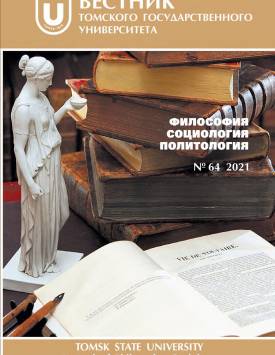Possibilities of Using Digital Footprints to Predict Educational Achievements of Students
The article summarizes one of the first experiences of using the analysis of students’ digital footprints for educational analytics tasks, namely, predicting the formal educational achievements of students. Prediction of educational achievement based on digital footprint data was based on the use of Data Mining and Machine Learning methods. Data Mining methods were used to obtain student digital footprint data. As input data, the user’s digital footprint from the social network Vkontakte, as well as data on student academic performance in the LMS Moodle of Tomsk State University, was used. Machine Learning methods were based on the application of the gradient boosting algorithm on decision trees from the CatBoost library. Data were obtained on 6,488 students of Tomsk State University. The sample set was divided into three parts: a training sample (70% of students), a validation sample (10% of students), and a test sample (20% of students). To build the model, the most significant components of the digital footprints of students were selected for determining educational achievements: gender, number of friends, direction of study, user interests - subscriptions. As part of building a predicting model, the following procedures were performed: a) differentiation of students into students with high (average score above the 65th percentile border) and low (average score below the 35 th percentile border) educational achievements was implemented; b) the procedure for selecting the most significant features, known as “feature selection”, was performed; c) a thematic classification of user subscriptions was carried out according to the following enlarged categories: spiritual life, esotericism; education, science; entertainment, humor; art; healthy lifestyle, sports; socio-political groups; business, work; economy, technology; junk subscriptions. The final quality metric (F-measure) of the final model for predicting high educational achievements became 78% for natural, 73% for technical and 69% for humanitarian areas of study. The conducted research has fixed the specifics of the digital footprint of students with high formal educational achievements. It manifests itself in personal interests, reflected in their subscriptions, as well as in some structural characteristics of the student’s Internet activity: the number of membership groups, the number of friends and subscribers. As a result, the analysis of the influence of digital footprints on educational achievements showed that now, at the junction of cognitive and cultural factors, a new type of factors is being formed that affects educational achievements - connective, associated with the peculiarities of the student’s online environment.
Keywords
digital footprint, students, educational achievement, machine learningAuthors
| Name | Organization | |
| Kashpur Vitaliy V. | Tomsk State University; Sirius University of Science and Technology | vitkashpur@mail.ru |
| Petrov Evgeniy Y. | Tomsk State University; Sirius University of Science and Technology | petrov@data.tsu.ru |
| Goiko Viacheslav L. | Tomsk State University; Sirius University of Science and Technology | goiko@data.tsu.ru |
| Feshchenko Artem V. | Tomsk State University; Sirius University of Science and Technology | fav@ido.tsu.ru |
References

Possibilities of Using Digital Footprints to Predict Educational Achievements of Students | Tomsk State University Journal of Philosophy, Sociology and Political Science. 2021. № 64. DOI: 10.17223/1998863X/64/13
